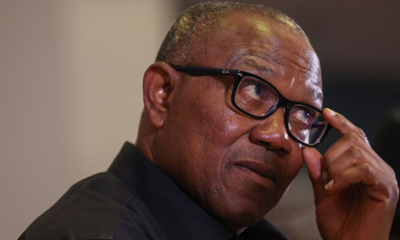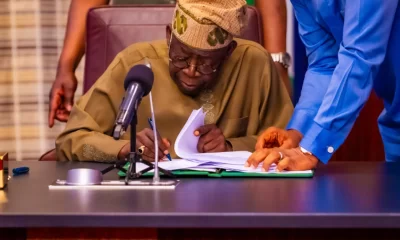News
Smuggled Nigerian petrol floods W’African markets, sells N1,700/litre

The Federal Government, on Monday, raised the alarm over the renewed smuggling of Premium Motor Spirit, popularly called petrol, following the massive hike in the pump price of the commodity in neighbouring countries.
It stated that while the average price of petrol in Nigeria was about N701/litre, the average cost of the product in neighbouring countries was N1,787/litre, a development that heightened PMS smuggling out of Nigeria in the past two weeks.
The Comptroller-General of the Nigeria Customs Service, Adewale Adeniyi, who disclosed this at a press conference in Yola, said the NCS had to join forces with the Office of the National Security Adviser to tackle the menace.
He said, “Today, we are here to update members of the public on the strategic efforts of the Nigeria Customs Service in addressing the critical issue of fuel smuggling through the recently launched Operation Whirlwind, under the auspices of the Office of the National Security Adviser.
“About a year ago, the Federal Government made the bold strategic decision to remove the fuel subsidy. This crucial step was aimed at freeing up substantial funds that could be redirected to other productive sectors of the economy, reducing pressure on our foreign exchange reserves, and diversifying economic growth.
“The immediate impact was an upward adjustment in fuel prices to reflect current realities. Despite the inflationary pressures and financial strain on households, particularly those with lower incomes, comparative studies still show that fuel prices in Nigeria remain the cheapest compared to other countries in the West and Central African region,” he stated.
PMS prices
Speaking further, Adeniyi said, “While PMS is sold at an average of N701.99 in Nigeria, it is sold at an average of N1,672.05 in the Republic of Benin and N2,061.55 in Cameroon. In other countries around the region, the price of PMS ranges from N1,427.68 in Liberia to N2,128.20 in Mali, averaging N1,787.57, according to the fuel price data obtained from opensource.”
The customs boss said this comparative price advantage, though beneficial to Nigerian citizens, unfortunately, created a lucrative incentive for smuggling PMS out of Nigeria, where prices were two to three times higher.
He said this is substantiated by the report on the average daily evacuation of PMS to various states in Nigeria, obtained from the Nigeria National Midstream and Downstream Petroleum Regulatory Authority.
In his speech, which was made available to our correspondent in Abuja, he said, “The (NMDPRA) report shows significant changes in evacuation patterns that are not justified by corresponding economic and demographic changes, particularly in border states that share contiguous borders with our neighbours.
“Between April and May 2024, Borno and Kebbi states recorded 76 and 59 per cent increases in evacuations, ranking among the top three states. On a year-on-year basis (May 2023 and May 2024), Sokoto and Taraba states recorded the most substantial increases in evacuations, with 247 and 234 per cent increases, respectively.
“Border states like Katsina and Kebbi also recorded more than 50 per cent increases in evacuation. These discrepancies, along with the price disparity between domestic PMS (N701.99) and neighbouring countries (N1,787.57), raise concerns about the actual delivery of PMS and the potential for smuggling.”
Adeniyi said credible intelligence on activities around border areas corroborated these suspicions.
“In response to the alarming increase in fuel smuggling, the NCS in close collaboration with the NSA initiated Operation Whirlwind. This nationwide operation aims to: a. Ensure that Nigerians enjoy the full benefits of fuel price deregulation in line with the vision of President Bola Tinubu.
Defend the national currency and reduce pressures that may be attributed to the activities of smugglers. c. Identify, dismantle and disrupt cartels of smugglers operating within the ecosystem. d. Raise awareness of the local communities and solicit their support to achieve these objectives,” he stated.
Anti-smuggling team
He said the operations, which were guided by credible intelligence and empowered by the new Customs Act 2023, target illegal exportation, particularly of petroleum products, ensuring their availability within the country and conserving government resources.
“Coordinated by a Comptroller of Customs, the operation covers all NCS Zones (A-D), involving selected officers trained and equipped to handle the task with strict adherence to professionalism.
“Collaboration with the ONSA and the NMDPRA supports the operation, utilising internal and external sources. This operation was launched approximately two weeks ago,” Adeniyi stated.
According to him, the NCS had made some significant strides in the ongoing Operation Whirlwind, aimed at curbing the smuggling of Premium Motor Spirit out of the country.
“In the past two weeks we have received credible intelligence on the relative stability of the price of PMS around border states, this is easily attributed to disruptions in the operations of smugglers. Within seven days of intensive operations, a total of 150,950 litres of PMS, valued at N 105,965,391, have been intercepted at various locations nationwide.
“The seizures include: a. On Friday, May 31, 2024. A total of 45,000 litres of PMS in a tanker was seized at Mova, Adamawa. b. On Saturday, June 1, 2024, a total of 45,000 litres of PMS in a tanker was seized at Mubi, Adamawa. c.On Monday, June 3, 2024, a total of 2,375 litres of PMS in 95 25-litre jerrycans were seized at Mubi, Adamawa State.
On Wednesday, June 5, 2024, a total of 4,450 litres of PMS in 178 25-litre jerrycans were seized in three different locations, including Song-Wuroboki, Mubi-Sahuda road and Gidan Madara
– Sahuda road all in Adamawa. e. On Thursday, June 6, 2024, a total of 20,030 litres of PMS in 25 and 30-litre jerrycans were sized in various locations across
the country including Maiha, Adamawa State, Illela, Sokoto and Agbaragba Creek in Mfum border of Cross River State.
On Friday, June 7, 2024, a total of 32,900 litres of PMS were seized at border locations in the North-East and South-West axis of the country. A total of 17,500 litres was recorded in Mubi, Adamawa State, while 15,400 litres was recorded around Imeko Obada Road in 616 25-litre jerrycans. g. On Saturday, June 8, 2024, a total of 8,525 litres of PMS were also seized in two separate locations in Owode (Owode-Ilaro road and Owode-Atan road) in Ogun State.”
Adeniyi stated that in addition to the ongoing operations under Operation Whirlwind, the Customs Area Commands remained vigilant against the illicit activities. of smugglers targeting PMS.
He said the service had recorded significant seizures of PMS from unpatriotic individuals attempting to deprive Nigerians of access to fuel and cause unnecessary hardship.
“While the operation continues, our Federal Operating Units and Marine Commands have intercepted a total of 129,185 litres of fuel valued at N90,558,685. Notably, 54.48 per cent of these seizures occurred in the North-West region, including states such as Katsina, Kebbi, and Sokoto, while 23.87 per cent of the seizures were recorded in the North-Eastern part of the country, particularly in states like Taraba and Adamawa.
“It is worth noting that these states have also seen a significant increase in fuel evacuation as reported by the NMDPRA. It is now evident that the recent rise in the distribution of PMS to border states is driven by the activities of smugglers.
“A combined diversion of 280,135 litres of PMS worth N196,524,075.50 raises serious economic concerns with broader implications on national security. The quantum of this diversion is equivalent to more than 84 per cent of the daily evacuation of PMS to states like Ekiti and Jigawa. It also represents around 32.57 per cent of the daily evacuation to the border states of Borno and Katsina according to the data on average daily evacuation obtained from NMDPRA,” Adeniyi said.
He noted that if these activities were left unchecked, they could further deteriorate the country’s economic situation and exacerbate current foreign exchange challenges.
The customs helmsman stated that the influx of unaccounted foreign currency could be channelled into funding illegitimate activities, including the support of non-state actors engaged in criminal activities against the Nigerian state.
“These issues have serious implications for national security, making it imperative to check, curtail, and dismantle these illicit operations. Achieving this requires the cooperation and collaboration of patriotic government agencies, exemplified by the ongoing Operation Whirlwind.
“Under this collaboration, efforts are being made to resolve existing gaps in the following areas: a. Sharing of Critical Data Among Agencies. Ongoing engagement with the NMDPRA and the ONSA focuses on sharing daily data on PMS loading. This will enable the NCS to track the movement and delivery of these products to their intended locations.
Monitoring movement of PMS lifting. The NCS will enforce strict monitoring of tanker movements, ensuring that
PMS products lifted from NMDPRA facilities are delivered to approved locations. c. Use of Manual Systems by Independent Marketers. Independent marketers are advised to automate their existing fleet management systems to enable tracking and geo-fencing
capabilities.
Proliferation of fuel stations at border areas. The NCS will collaborate with relevant licensing agencies to manage the proliferation of petrol stations around border areas,” Adeniyi stated.
He said these measures were essential and would be rigorously implemented to ensure strict adherence to government expectations.
“However, in enforcing these measures, we are mindful of the potential challenges they may pose to border communities. Our operations will not obstruct or interfere with the legitimate activities of patriotic citizens in these areas. I will conclude with a stern warning to the perpetrators of these illicit acts: Desist immediately or face the full wrath of the law,” Adeniyi declared.
Petrol subsidy
On May 29 2023, the Federal Government removed the subsidy on petrol.
Earlier in February that year, the government declared that it had to shut down 270 filling stations in a bid to stop the smuggling of petrol out of Nigeria.
It said the activities of smugglers pushed Nigeria’s petrol consumption daily to about 67 million litres because a large volume of the product was moved out of the country illegally by smugglers.
The PUNCH precisely reported on February 3, 2023 that the Federal Government had to deploy operatives of the Department of State Services on tankers transporting petrol to filling stations to halt the diversion and smuggling of the product.
The report stated that over 120 DSS officers were deployed at the time to follow fuel tankers to their various retail outlets in Abuja, as more security agencies were drafted into the exercise for nationwide coverage.
This came as the government also revealed at the time that it shut down over 270 filling stations for being involved in diverse infractions such as hoarding and selling above-approved price, among others.
The Chief Executive of the Nigerian Midstream and Downstream Petroleum Regulatory Authority, Farouk Ahmed, and the Group Chief Executive Officer of the Nigerian National Petroleum Company Limited, Mele Kyari, disclosed this in Abuja during a live television programme monitored by our correspondent.
Speaking on efforts being put in place to halt the diversion and cross-border smuggling of PMS, Kyari had said, “So much is going on, there are government security interventions.
“I know the kind of work that we do with the security agencies, for instance, in Abuja alone, we have over 120 DSS officers following every truck to fuel stations and we are activating this across the country.
“We are ensuring that we get other government security agencies to follow these trucks to their locations, in order to be very sure that these trucks actually get to the fuel stations and there are not sold on the way and they don’t cross the borders.”
Kyari had earlier explained at a stakeholders meeting in Abuja that Nigeria’s fuel was smuggled to other countries, as he insisted that the scarcity of PMS at the time was not due to the elections that were held in February 2023.
“There’s no dispute about this that our fuel gets to other countries, including in marine containers. We have evidence now that some of our customers are actually taking investors to other countries and we will get to the root of this.
“The appropriate government security agencies will deal with this. But this is the reality that we are dealing with. You do have cross-border smuggling, either in the form of round-tripping or whatever name we call it.
“So the 66 or 67 million litres that you have always seen include all these, the cross-border smuggling volumes. And it means that anytime we don’t satisfy those markets, it will affect your domestic market. This is the reality that we are dealing with,” he stated.
The NMDPRA boss, while speaking on sanctions taken against downstream operators who flouted the approved regulations, stated that over 270 filling stations and seven depots were closed at the time.
Ahmed had said, “Because of control that we have in most of the major cities, whether it is Port Harcourt, Lagos, Ibadan, Abuja, etc, the marketers tend to go to the rural areas where you can buy petrol at a high price.
“And, of course, it is our responsibility as a regulator to ensure strict monitoring and enforcement. What we did was that a couple of weeks ago we had to shut about seven depots because of the inflation of their ex-depot price.”
Source: The Punch

News
APC appoints Ali Bukar Dalori as acting National Chairman
The All Progressives Congress (APC) has appointed Hon. Ali Bukar Dalori as the acting National Chairman of the party following the resignation of Dr. Abdullahi Umar Ganduje.
Dalori, who currently serves as the Deputy National Chairman (North), was directed by President Bola Ahmed Tinubu to assume the leadership role in an acting capacity pending the meeting of the party’s National Executive Committee (NEC), which is being convened immediately to fill the vacancy.
The announcement was contained in an official statement signed by the party’s National Publicity Secretary, Felix Morka, on Friday in Abuja.
According to the statement, Ganduje tendered his resignation with immediate effect in order to attend to “urgent and important personal matters.”
Dalori’s appointment comes nearly two years after Ganduje was appointed National Chairman in August 2023, succeeding Senator Abdullahi Adamu.
During his tenure, Ganduje was praised for promoting party cohesion, driving electoral strength, and overseeing key defections into the party.
With Dalori now at the helm, the APC said it remains “steadfast and unwavering” in delivering President Tinubu’s Renewed Hope Agenda and sustaining internal unity.
The party expressed gratitude to Ganduje for his “invaluable contributions and distinguished record of service” and extended well wishes for his future endeavours.
News
Fresh details as Tinubu signs tax reform bills into law

President Bola Tinubu has signed the four tax reform bills into law. Tinubu assented to the bills at the Presidential Villa on Thursday.
The four proposed laws are the Nigeria tax bill, the Nigeria tax administration bill, the Nigeria revenue service (establishment) bill, and the joint revenue board (establishment) bill.
The signing ceremony was attended by Senate President Godswill Akpabio, Tajudeen Abbas, speaker of the house of representatives, and Julius Ihonvbere, house majority leader.
Also present were Abdulrazaq Abdulrahman, governor of Kwara, Hope Uzodinma, his Imo counterpart, and Wale Edun, minister of finance, among others.
Tinubu transmitted the proposed legislation to the national assembly on October 3, 2024, urging lawmakers to pass the tax reform bills.
The bills initially faced opposition from the northern governors, who argued that the proposed laws could harm the region’s interests, asking the national assembly to reject the bills and demanding fair and equitable implementation across all regions.
However, in January, the Nigeria Governors’ Forum (NGF) endorsed the bills after agreeing on an “equitable” VAT-sharing formula.
The house of representatives passed the bills in March, while the senate approved them in May.
On June 18, the legislature transmitted the bills to the president for assent.
Speaking earlier on Thursday, Tinubu said the tax bills will unify the country’s fragmented tax system.
“They (tax reform bills) deliver the first major, pro-people tax cuts in a generation, targeted relief for low-income earners, small businesses, and families working hard to make ends meet,” Tinubu said.
“For too long, our tax system has been a patchwork—complex, inequitable, and burdensome. It has weighed down the vulnerable and shielded inefficiency. That era ends today.”
Tinubu added that the bills will eliminate wasteful duplications, reduce red tape, restore investor trust, and promote transparency and coordination at all levels.
Crime
Businessman, Pebeto Enerji Limited arraigned by EFCC for $75,000 fraud

A businessman, Peter Otomewu and his company, Pebeto Enerji Limited, were on Monday arraigned by the Economic and Financial Crimes Commission, before the Ikeja Special Offences Court for allegedly defrauding a petroleum services company of $75,000.
The defendants were docked on a two-count charge bordering on obtaining money by false pretence and stealing, preferred against them by the EFCC.
The anti-graft agency’s prosecution counsel, M.S. Owede, told the court that Otomewu and his firm committed the alleged offences sometime in 2018.
Owode told the court that the defendants fraudulently obtained the sum of $75,000 from Virgin Forest Energy Limited under the false pretext that they had a vessel, MT AYSU, capable of transshipping petroleum products from a mother vessel.
The prosecutor alleged that the representation was false and that the money was never used for the stated purpose.
Otomewu and his firm were accused of dishonestly converting the entire $75,000 property of Virgin Forest Energy Limited to their use.
According to the EFCC, the offences committed contravened Sections 278, 278(1), and 411 of the Criminal Law of Lagos State, 2015, and Section 1(1)(a) and 1(3) of the Advance Fee Fraud and Other Related Offences Act, 2006.
However, both defendants who were docked before Justice Mojisola Dada pleaded not guilty to the charges against them when it was read.
Following the not-guilty plea, Owede asked for a trial date and also urged the court to remand the first defendant, Otomewu, in a correctional centre.
But the defence counsel, Mr Peter Ajabor, however, prayed the court to grant bail to the defendants on liberal terms.
Consequently, Justice Dada granted bail to the defendants in the sum of N50m, with two sureties in like sum.
The judge ordered that the sureties must be gainfully employed and reside within the court’s jurisdiction.
She also ordered that the sureties must have N50m in their bank accounts.
Justice Dada further ordered the remand of Otomewu in the correctional centre, pending the perfection of the bail conditions.
The matter was adjourned to September 29, 2025, for commencement of trial.
Crime
EFCC quizzes Abuja businesswoman Halimat Tejuosho over alleged appointment scam

The Economic and Financial Crimes Commission (EFCC) has interrogated an Abuja-based businesswoman, Halimat Tejuosho, over her alleged involvement in an appointment and contract scam.
Tejuosho, said to be the founder of Haleems Integrated Services Limited, was reportedly quizzed after victims accused her of using false pretenses to obtain funds in exchange for promises of federal appointments and lucrative government contracts.
Counsel to one of the victims, Chief Tolu Babaleye, alleged that Tejuosho ran an elaborate scheme involving forged documents and fake appointment letters to deceive unsuspecting individuals.
He claimed she posed as an aide to the National Security Adviser, Mallam Nuhu Ribadu, to lend credibility to her claims.
“The court had earlier recommended her for prosecution on charges bordering on Advance Fee Fraud, Criminal Diversion of Funds, Criminal Breach of Trust, and Cheating,” Babaleye said.
He also alleged that Tejuosho used her involvement in humanitarian and NGO activities as a smokescreen to attract victims and gain their trust.
EFCC Spokesperson, Mr Dele Oyewale, confirmed that she was invited for questioning and has since been granted administrative bail under stringent conditions.
Investigations are ongoing, and the commission says she may be formally charged to court in the coming weeks.
The anti-graft agency also urged other potential victims to come forward, reiterating its resolve to clamp down on all forms of financial crime.
News
BREAKING: No date for Fubara’s return as Pro-Wike blocks suspended governor

Suspended Rivers State Governor Siminalayi Fubara is not anticipated to return to office despite his recent meeting with President Bola Ahmed Tinubu at the latter’s residence in Lagos.
Reports indicate that photographs of Fubara’s meeting with Tinubu circulated widely on social media, coinciding with discussions regarding the ongoing crisis in Rivers State.
This situation places him in a precarious position, particularly as lawmakers aligned with former Governor Nyesom Wike have expressed dissatisfaction with his association with Tinubu.
ThePapers has learned exclusively that Fubara is currently lobbying for his reinstatement; however, he has not yet fulfilled certain conditions that were mutually agreed upon.
Sources in Lagos have disclosed that Fubara’s return is not imminent, contrary to some media reports, emphasizing that there are specific conditions he continues to negotiate, which may further delay his anticipated reinstatement. Additionally, another source has indicated that certain decisions would need to be reversed if his suspension were to be lifted. However, the governor appears to be attempting to appease Wike’s adversaries by neglecting these critical aspects during negotiations.
“As for the President, he has no problem in lifting his suspension today, but the suspended governor is trying to dodge some agreed terms which are part of the problem and there’s no way the crisis won’t continue if he returns.
“The President has told him to meet everyone affected and make peace with them, that everyone should speak in his favour and let the matter end in peace. But Fubara is ignoring some people of course.”
Fubara’s major now is Pro-Wike who are yet to agreed on certain terms and are set to meet the president over their own grievances.
Meanwhile, former President Goodluck Jonathan is among high-profile Nigerians quietly lobbying for the reinstatement of suspended Rivers State Governor Siminalayi Fubara, with mounting expectations that a resolution could be reached before June 12, according to Politics Nigeria.
It is understood that Jonathan has already engaged President Bola Tinubu in a lengthy telephone conversation, advocating for Fubara’s return “on or before June 12 in the spirit of Democracy Day.”
Governor Fubara was suspended on March 18 following a controversial presidential order. The decision, widely described as unconstitutional, has drawn sharp criticism from legal experts and political observers who argue that “there is no part of the Constitution which empowers the president to suspend/remove an elected governor,” even in the event of emergency rule.
Fubara, his deputy Ngozi Odu and state lawmakers were suspended for six months following heightened tension between the governor and his predecessor Nyesom Wike.
Crime
Court remands doctor in EFCC custody over alleged ₦39 million caregiver job, visa scam

Dr. Nekabari Dambere Nathan, a medical practitioner based in Port Harcourt, Rivers State, has been arraigned by the Economic and Financial Crimes Commission (EFCC) for allegedly defrauding clients of N39,157,000 under the guise of providing international visas and job placements.
Nathan was arraigned alongside his company, Global Horizons Academy Ltd, on Thursday, before Justice P. I. Ajoku of the Federal High Court sitting in Port Harcourt, Rivers State, on a one-count charge bordering on obtaining by false pretence and advance fee fraud.
According to the charge, between April 8 and December 12, 2023, Nathan allegedly obtained N39.1 million from Justice Toojah Iyieagbu, Managing Director of Riskout Consults, claiming the money was for processing visas to Canada, Ireland, and the United States of America for his clients.
The EFCC stated that the promise was false and constituted an offence under Section 1(1)(a) and punishable under Section 1(3) of the Advance Fee Fraud and Other Fraud Related Offences Act.
The charge reads in part: “That you, Dr. Nekabari Dambere Nathan and Global Horizons Academy Ltd between 8th April, to 12th December 2023 at Port Harcourt within the jurisdiction of this Honourable Court, with intent to defraud, did obtain the sum of Thirty-Nine Million, One Hundred and Fifty-Seven Thousand Naira (N39,157,000,00 only), from Justice Toojah lyieagbu, the Managing Director of Riskout Consults, which was meant for processing of visa for his clients for Canada, Ireland and the United State of America, a pretence you knew to be false and thereby Committed an offence contrary to Section 1(1) (a) and punishable under Section 1(3) of the Advance Fee Fraud and Other Fraud Related Offences Act.”
Dr. Nathan pleaded “not guilty” to the charge.
Following the plea, prosecution counsel A. Abubakar requested a trial date and urged the court to remand the defendant in a correctional facility.
Defence counsel Friday Otanjah informed the court that a bail application had already been filed on medical grounds, requesting the court to grant the defendant bail to enable him to stand trial.
Justice Ajoku ordered that the defendant be remanded in EFCC custody pending the bail hearing and adjourned the case to June 25, 2025, for hearing of the bail application. The trial was scheduled to commence on November 27, 2025.
According to the EFCC, the case followed a petition filed by Iyieagbu, who alleged that Dr. Nathan posed as a professional caregiver trainer and travel agent. The petitioner said Nathan falsely promised to secure visas, job placements, and enrollment in IELTS exams for Nigerian students interested in relocating abroad.
Iyieagbu alleged that multiple students transferred the total sum of N39.1 million to Nathan, who thereafter became unreachable and allegedly frustrated all efforts to recover the funds.

 Sports2 weeks ago
Sports2 weeks agoOfili: ‘Nigeria doesn’t deserve you’ – Fans react as athlete switches allegiance to Turkey

 News2 weeks ago
News2 weeks agoUS Back Out: Angry Trump withdraws support for Israel, issues fresh warning, “Do not drop those bombs”

 Sports2 weeks ago
Sports2 weeks ago‘Don’t sign him, he doesn’t follow instructions’ — Club warned against signing Super Eagles star

 Spotlights2 weeks ago
Spotlights2 weeks agoNo More War: US plots Donald Trump impeachment over unauthorized Iran bombing

 Politics2 weeks ago
Politics2 weeks ago‘There’ll be upset’ – Fresh prophecy warns APC over New political party, Shettima crisis

 Spotlights2 weeks ago
Spotlights2 weeks agoAtiku sidelined again as ADA picks Presidential Flagbearer

 Politics1 week ago
Politics1 week agoFresh crisis hits coalition as El-Rufai, Obi may pull out over Atiku’s silence game


















